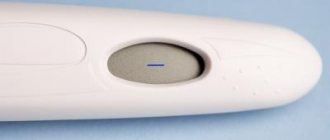Most representatives of the fairer sex have experienced menstrual irregularities at least once in their lives. A delay of 6 or more days in menstruation can be caused by a huge number of factors, both subjective and objective.
To establish the cause of this phenomenon, the overwhelming number of women immediately buy a pregnancy test. If he confirmed the guess, the question is clear. We need to prepare for a new addition to the family.
But when only one line appears on the test, you must immediately contact the gynecological department of the nearest clinic to determine the causes of the dysfunction.
My period is a week late, what could be the reason?
As sad as it may be, any woman sooner or later experiences menstrual irregularities.
Delay in monthly bleeding by 6 or more days can be caused by various reasons. Having noticed a rather long delay, most women first go to the nearest pharmacy and buy a pregnancy test.
A positive test result casts aside doubts about the reasons for the absence of critical days. A negative test result, in turn, signals the need for an urgent visit to a gynecologist to check the condition of your body.
The article discusses the main reasons for a 6-day delay in menstruation, what symptoms may indicate that a 6-day delay in menstruation appeared for a physiological reason, and when the reasons for a 6-day delay in menstruation are pathological health problems, that is, the development of gynecological and other diseases.
Treatment
Even if a pregnancy test purchased from a pharmacy chain showed a negative result, if menstruation is delayed by a certain number of days, you should still make sure that there is no conception. To do this, it is better to contact a antenatal clinic.
When the fact of the absence of an embryo is confirmed by a medical professional, you should make an appointment with a gynecologist, who will be able to diagnose and prescribe the necessary treatment procedures for the patient aimed at normalizing menstrual cycles.
At the initial stage of the study, the specialist prescribes the necessary tests and sends the girl for an ultrasound examination of the pelvic organs. This allows you to immediately determine the presence of pathologies such as polycystic ovary syndrome or endometriosis.
When there is a suspicion that a delay in menstruation is due to hormonal imbalances in the body, the patient needs to make an appointment with an endocrinologist who specializes in such problems. This doctor, if necessary, prescribes a number of additional diagnostic measures:
- Analysis of urine;
- blood tests;
- ultrasound examination of the kidneys;
- adrenal gland examination;
- abdominal examination.
As soon as the endocrinological pathology is eliminated, the reproductive cycle will automatically return to its usual rhythm of work.
For correct and effective treatment, first of all, factors affecting the functioning of the reproductive organs should be eliminated.
This, as well as the correct choice of therapeutic measures and medications, will bring menstrual bleeding back to normal. In some cases, just normalizing the diet and including foods containing essential vitamins, minerals and trace elements in the diet will help get rid of delays in menstruation.
Delayed menstruation 6 days during a normal cycle, reasons
It should be noted right away that a delay of 6 days or 1 week in itself may be a sign of the development of pathology, but most often such a delay in menstruation occurs for physiological reasons. The time interval between successive reproductive cycles of a healthy woman lasts from 21 to 32 days. The count should be from the first day of bleeding of each cycle. In the absence of disturbances in the functioning of internal organs and their systems, this gap should be constant from month to month.
A long delay in menstruation, reaching 6 days, if it is not a consequence of fertilization of the egg by the sperm, indicates the presence of pathological processes in the woman’s body.
At the same time, a slight deviation in the onset of menstruation (up to two days), which appears once, is not a cause for concern and is considered acceptable. If this situation repeats with noticeable frequency, the woman should contact a specialist for examination or examination.
https://youtu.be/BO9wdsvGhaw
Lack of menstruation for 6 days during pregnancy
There are cases when the delay in menstruation reaches a long period, and the pregnancy test shows one line. In this case, indirect signs indicate successful conception. A 6-day delay in menstruation can occur for many reasons, one of which is pregnancy. Therefore, it is so important to know the main symptoms of pregnancy with a 6-day delay in menstruation (menstruation).
Among these first signs of pregnancy, the following can be identified: causeless nausea and vomiting, fatigue and drowsiness, frequent mood swings, sudden changes in gastronomic preferences, swelling of the mammary glands.
Having noticed one or more warning signs of pregnancy, girls are advised to do the following:
- 2-3 days after receiving a negative pregnancy test result, repeat it again in the morning; To obtain more reliable indicators, it is advisable to use a test from another manufacturer. If the cause of the delay is pregnancy, a repeat test should reflect this;
- donate blood for analysis regarding the content of chronic gonadotropin. The level of this hormone allows you to determine the onset of pregnancy before any signs indicating it appear;
- if pregnancy is not confirmed using the above testing methods, the only solution would be to visit a gynecologist to examine the reproductive system for pathologies.
Diseases that lead to disruption of the menstrual cycle, delayed menstruation
A long delay in menstruation, when a period is delayed by 5, 6, 7 or more days, can be a manifestation of a number of diseases or the cause of other factors affecting the body.
- Malfunctions in the hormonal system, which result in disruption of the production of sex hormones, often become the main cause of disruption of the menstrual cycle, when menstruation is delayed by 5, 6, 7 days, a week or even 2 weeks. This situation can be caused by many pathologies. An accurate diagnosis can be established through a thorough gynecological examination, which involves taking various tests and undergoing certain procedures.
- Polycystic ovary syndrome as a cause of delayed menstruation by 6 days. The formation of cysts on the ovaries very often causes the late onset of menstruation. This deviation, unfortunately, is familiar to the fair sex. Its first signs are strong male-type body hair and excessive sebum production, observed in the form of an oily coating on the skin and hair.
- Diseases of the reproductive system and no menstruation for 6 days. Their presence is indicated by pain in the genital area. Among such diseases, fibroids and adenomyosis, endometriosis, inflammation in the uterus, its appendages and ovaries, and the development of malignant tumors are most often distinguished.
- Endocrine system disorders and ovarian dysfunction. Interruptions in the normal functioning of the liver, kidneys, adrenal glands and thyroid glands can cause a delay in menstruation for more than a week, as well as provoke secondary amenorrhea.
- Menopause is a common cause of delayed menstruation. During menopause, women very often experience painful symptoms, hot flashes during menopause, heavy vaginal discharge or delayed menstruation when there is no period for 1 week, 2 weeks or even a month. A delay in menstruation by 2, 3, 4, 5, 6 days during menopause can be a fairly common symptom of menopause. In some cases, a woman’s menopause occurs earlier than the generally accepted period. For example, the onset of processes characteristic of menopause in women under 35 years of age is atypical. This pathology is explained by problems with the proper production of hormones by the endocrine glands.
What do heavy periods mean?
If you experience heavy periods after a delay, this does not always indicate pathology; perhaps this is a physiological feature of your body. But in the case when heavy periods occur after a delay in the regular cycle, the question arises: is it worth worrying about this?
You should worry, since a similar condition can occur after a pregnancy has occurred, and the presence of heavy bleeding indicates a miscarriage. Another reason why menstruation began after a delay may be gynecological diseases. For example, one of them is an ovulatory anomaly. The following factors can provoke it:
- inflammatory processes;
- late ovulation;
- stressful situations.
Lack of ovulation, which can occur due to taking certain medications immediately before menstruation, which delays its onset by an average of 2 weeks. Diseases such as corpus luteum cyst or ovarian cyst can disrupt the menstrual cycle. And even a change in climate zone can affect a woman’s menstrual cycle. In this case, age is not important; heavy menstruation can occur both in young teenage girls and in mature women who have reached menopause.
Another reason for delayed menstruation, followed by heavy periods, may be a malfunction of the hypothalamus, which is responsible for the functioning of the uterus and ovaries. Such disruptions can occur during periods of strong emotional stress, which causes hormonal disruptions in the body and, as a result, a delay in menstruation. The cycle can also be disrupted due to physical activity, sudden weight loss, or rapid gain of extra pounds.
https://youtu.be/mZfJMkqTaVk
Other reasons why your period is 6 days late, what could be the reason?
Menstruation can occur untimely not only due to gynecological or endocrine disorders. It can be caused by a woman’s habitual lifestyle. Having noticed a delay in monthly bleeding for 5 or 6 days, without identifying pathological processes, the patient should analyze her daily actions that can cause menstrual irregularities.
- Following strict diets or overeating are common causes of delayed periods for a long time.
- Moving or traveling to a place with a different climate or time zone than your previous location may cause your period to arrive at the wrong time.
- Exhaustive physical activity and sports inhibit the activity of the reproductive system, and therefore also often cause delayed menstrual flow.
- Emotional shocks and stress, long-term illness, as well as injuries and mechanical damage to the genital organs, all these reasons can lead to a delay in menstruation for a period exceeding 6 days and even a delay in menstruation by 1 week.
- Taking hormone-containing medications (in particular, oral contraceptives). Causes malfunctions due to incorrect selection of the active substance or violation of the rules of administration. Corrected with the help of a gynecologist.
What to do if you haven’t had your period for 6 days, when should you seek help from a doctor?
If there is a negative result in a pregnancy test, you need to listen for the appearance of other, additional symptoms:
- Feeling of burning and itching;
- Sores may be observed in the vaginal area;
- Discharge with an unpleasant odor appeared from the vagina;
- Brown discharge. They may indicate pathology of internal organs (infection, inflammation), as well as ectopic pregnancy. The reason may also be a recent surgery on the female organs. In any case, it is recommended to consult a doctor to make an accurate diagnosis.
If you have additional signs, you should definitely consult a doctor, because they may indicate serious illnesses. If your period is delayed by several days, then there is nothing dangerous in this; the main thing is to immediately determine the cause of this phenomenon.
What should be done?
If the test is negative on the sixth day of the delay, the first thing to do is not to panic. In most cases, such delays are not a sign of pathology. To exclude or confirm pregnancy, you can do a repeat test in two to three days, or you can immediately consult a doctor.
Ultrasound examination and blood testing for the presence of gonadotropin are superior to any test in accuracy. In addition, if there is still a pregnancy, they will help to find out the place of attachment of the fertilized egg, to exclude ectopic pregnancy, and the level of its development. If there is still no pregnancy, the doctor will prescribe additional tests and, if necessary, refer you for a consultation with an endocrinologist, neurologist or nutritionist.
How to treat a delay of menstruation (periods) for 1 week or more?
A negative pregnancy test result should be confirmed with a repeat test a few days later or contact an antenatal clinic for testing.
Lack of conception, confirmed by medical research, and accompanied by delayed menstruation, must be examined with the help of a gynecologist, who, if necessary, decides on additional examination of the patient and prescribes treatment aimed at restoring normal functioning of the reproductive system.
First of all, the girl is sent for an ultrasound examination of the pelvic organs and a number of specific tests. These measures primarily detect the presence of polycystic ovary syndrome and endometriosis.
If a delay caused by hormonal imbalance is suspected, the patient may need to consult an endocrinologist.
After examination, this specialist decides to send the patient for urine and blood tests, ultrasound of the kidneys, examination of the adrenal glands and abdominal examination. Elimination of endocrinological pathologies very quickly returns the reproductive system to a normal working rhythm.
Achieving the maximum effect of treatment requires eliminating factors that suppress the functioning of the reproductive system. In some cases, in addition to therapeutic measures, it is enough for the patient to review the diet and diet and increase the dose of vitamins and microelements consumed. Many women keep a menstrual calendar, so they can easily determine the expected start date of their next period, thus planning their activities for these days. The onset of critical days at the expected time indicates the proper functioning of the reproductive system.
In some cases, menstrual flow begins late. This may be due to pregnancy. If the fact of conception is not confirmed, the cause of the cycle disruption should be clarified with the help of a gynecologist or endocrinologist.
Source: womanchoise.ru
Similar articles
- Why is there a delay in menstruation every month, reasons for a delay in menstruation? The body of a modern woman is subjected to serious overload - both physical and psychological - which ultimately affects her menstrual cycle. Almost every second representative of the fair half of humanity is faced with temporary or...
- Delayed menstruation after first sex, reasons for delayed menstruation In the life of every girl, the moment when she turns into a real woman is very important. Despite the positive aspects of this process, there is also stress for the body. Therefore, late menstruation after the first sex is...
- Delayed menstruation, menstruation 14 days, 2 weeks, reasons Not every woman marks the start of her menstruation, so a delay of one to three days in the onset of menstruation can be missed. But when the onset of your period is 14 days late, there is reason to think. The first thing that comes...
Why is the test negative?
It is worth noting that a delay of two to three days in menstruation is quite common and is a type of norm. After all, the female body is not a clock; it is subject to the influence of mood, high stress and hormonal changes. But even if there is a delay of 6 days, and the test is negative, then you should not panic. There may be several reasons for this.
Physiological causes of delay
Normally, the menstrual cycle should be regular. Its duration can vary quite widely. There are both very short, 21 days, and extra-long, up to 35–37 days, female cycles. In this case, the duration of one cycle may change for several reasons:
- If the girl has just entered this period. On average, girls begin menstruation at 12–14 years of age. The next two years the cycle is stabilizing. During this time, delays of several days and even a week are the norm.
- Hormonal imbalances associated with the onset of menopause. Just as in adolescence, women of the golden period experience noticeable hormonal changes that cause cycle jumps and a delay in menstruation.
- The postpartum period, especially if you are breastfeeding. The lactation hormone produced at this time, prolactin, inhibits the onset of the next ovulation, and, therefore, the onset of menstruation. The cycle after childbirth can return to its limits within a year.
- Abortion may also be accompanied by a long recovery period for the cycle.
- Use of oral contraceptives.
Lifestyle and diet
A delay in your next period may be caused by your lifestyle or poor diet. Such factors in themselves are not a pathology. However, if you leave them unattended, you can end up with a serious illness. Such reasons include:
- Long periods of intense emotional and physical stress. Delayed menstruation during heavy physical work is quite common, and this condition is especially familiar to women who play sports professionally.
- Excess body weight. The proper functioning of the endocrine system is directly related to weight control. When it changes, no matter in what direction, hormonal disruptions will occur in the body.
- Long-term, strict diets or fasting, leading to lack of body weight. Nature intended that the ability to bear children, and, consequently, a normal, stable cycle, is closely related to a woman’s weight. If you are underweight, this connection is disrupted.
- Abrupt change in climate and time zone.
Pathological causes
However, a delay of 6 days or more may not always be part of the norm or a consequence of poor nutrition. If the test persistently shows one line, but your period still does not come, a cycle disorder may be caused by:
- Inflammation of the genitourinary system.
- Uterine fibroids, which can cause both heavy bleeding and prolonged delays.
- Polycystic disease is a disease characterized by the formation of many follicles filled with fluid in the ovaries and accompanied by serious hormonal disorders.
- Diseases of the endocrine system, especially disorders associated with the thyroid gland or ovarian dysfunction.
- Endometriosis is a disease in which cells from the lining of the uterus begin to appear in other organs and tissues. Most often, the ovaries and fallopian tubes are affected, sometimes the abdominal organs and even lung tissue are involved in the process.
You should not make a diagnosis and treat it yourself. The cause of the cycle disruption must be determined by a doctor.
Pregnancy
The possibility of a false negative test result should not be discounted. It happens that the treasured second stripe does not appear, even if there is a pregnancy. The reason is not always a faulty test or improper use. The most common reason for a negative result is that the test was performed too early.
Sometimes the ovulation date may shift towards the end of the menstrual cycle. Fertilization occurs, after which the egg, rather slowly, begins to move towards the uterine cavity. This period can last up to six days.
Having reached the uterus, the fertilized egg can spend another day floating freely and only then find a place for implantation.
After the fertilized egg has attached to the mucous membrane, the body begins to produce the main pregnancy hormone - human chorionic gonadotropin (hCG). If we talk about timing, hCG begins to be released into the blood approximately a week after conception. However, it enters the urine a little later, around day 10–14. Thus, a missed period even with a negative test result may indicate pregnancy.











